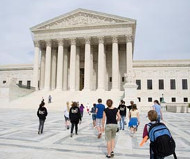US Supreme Court Considers Random Use Of Drug Dogs During Traffic Stops
US Supreme Court Considers Random Use Of Drug Dogs During Traffic Stops
http://www.thenewspaper.com/news/46/4622.asp
Some Supreme Court justices question whether Fourth Amendment intrusions during traffic stops have gone too far. Should police have the power to order a driver out of his car while a search is conducted with a drug dog -- even when there is no reason to believe the motorist has done anything wrong? That was the question posed to the US Supreme Court during oral arguments on Wednesday in the case of Dennys Rodriguez.
Should police have the power to order a driver out of his car while a search is conducted with a drug dog -- even when there is no reason to believe the motorist has done anything wrong? That was the question posed to the US Supreme Court during oral arguments on Wednesday in the case of Dennys Rodriguez.
Rodriguez was stopped on March 27, 2012 after a Nebraska police officer saw him briefly swerve. On a hunch, the officer decided to call for a drug dog. After about half an hour, the dog alerted, and Rodriguez was arrested and found guilty of possession. The US Court of Appeals for the Eighth Circuit upheld his conviction last year (view appellate decision).
Shannon P. O'Connor, public defender for Rodriguez, argued that the sniff should be suppressed because it was conducted after the officer completed writing the traffic ticket. Once the underlying reason for the stop is complete, O'Connor insisted, there is no justification to detain a motorist further. Some justices were not convinced that the act of writing a ticket ends the stop.
"In Justice [Antonin] Scalia's hypothetical, the officer said, 'I'm not going to give you a ticket, but I just want to ask you a few questions,'" Justice Anthony Kennedy said. "It seems to me that under your argument, those questions are impermissible because he's made his decision: He's not going to give a ticket."
Justice Sonia Sotomayor jumped in to clarify O'Connor's argument. What he meant, she said, was that once all the steps involved in writing a ticket are complete -- which would include checking the vehicle registration -- the stop must end.
"You've tied it to just writing it handing over the ticket," Justice Sotomayor said. "But you're not even doing that. You're saying, 'Just writing the ticket,' which is crazy."
Justice Scalia wondered under this theory whether dog sniffs could just become a routine part of the ticket writing process.
"Part of the mission where you stop somebody is not just the broken taillight, but, you know, whether the car is stolen, whether you have drugs on the car, so let's bring in a dog and do the car sniff," Justice Scalia said. "I mean, you're willing to expand the mission to everything up to but not beyond the dog sniff. Why do you do that?"
O'Connor insisted that once the original purpose of the stop was accomplished, the driver must be free to go. Justices Samuel Alito and Ruth Bader Ginsburg objected.
"If we hold that it's okay to have a dog sniff so long as it's before the ticket is issued, then every police officer -- other than those who are uninformed or incompetent -- will delay the handing over of the ticket until the dog sniff is completed," Justice Alito observed. "So what does that accomplish? I mean, it's great for your client, but what does it do for the law?"
Justice Department lawyer Ginger D. Anders insisted that motorists can be delayed for any "reasonable" amount of time -- 35 to 40 minutes or so -- to conduct a drug dog sniff. Justice Sotomayor opposed this notion.
"I have a real fundamental question, because this line drawing is only here because we've now created a Fourth Amendment entitlement to search for drugs by using dogs, whenever anybody's stopped," Justice Sotomayor said. "Because that's what you're proposing. And is that really what the Fourth Amendment should permit? ...[The Fourth Amendment] says you can't search unless you have probable cause to search."
"Destroying the New World Order"
THANK YOU FOR SUPPORTING THE SITE!
Latest Activity
- Top News
- ·
- Everything
Disgraced Former CNN Anchor Don Lemon Arrested
Our Crazy Modern World
2DF36465-A826-443C-A3A8-6638BC1D4FFA
G_LrzqtXMAAhT7w
2DF36465-A826-443C-A3A8-6638BC1D4FFA
2DF36465-A826-443C-A3A8-6638BC1D4FFA
Jacob Collier Improvises With Orchestra (Live in San Francisco)
© 2026 Created by truth.
Powered by
![]()
You need to be a member of 12160 Social Network to add comments!
Join 12160 Social Network